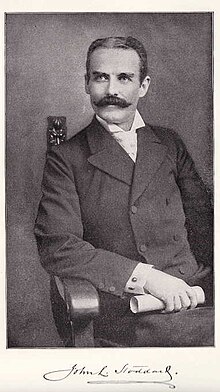John Lawson Stoddard
| John Lawson Stoddard | |
|---|---|
 |
|
| Born |
April 24, 1850 Brookline, Massachusetts, USA |
| Died | June 5, 1931 (aged 81) |
| Education | Williams College & Yale Divinity School |
John Lawson Stoddard (April 24, 1850 – June 5, 1931) was an American writer, hymn writer and lecturer who gained popularity through his travelogues.
Stoddard was born in Brookline, Massachusetts, in 1850. In 1871 he graduated from Williams College. At Williams he was a member of the fraternity Delta Psi (aka St. Anthony Hall). Later he studied two years of theology at Yale Divinity School. After that he taught Latin and French at Boston Latin School. He was proud of his descent from Solomon Stoddard.
He began traveling around the world in 1874 and published Red-Letter Days Abroad in 1884. He turned his experiences into a series of popular lectures delivered throughout North America. These lectures were periodically published in book form as John L. Stoddard's Lectures and eventually numbered 10 volumes and five supplements (1897-1898). In 1901, Stoddard published a book on Gibraltar. The books include numerous illustrations derived from the immense catalog of photographs taken by Stoddard, and cover every subject, from art and architecture, to archaeology and natural history. The books were immensely popular in their day and many copies still survive. Later in life, Stoddard also published poetry, as well as books on religious subjects.
Brought up a Protestant, Stoddard was an agnostic for more than 30 years before converting with his wife to Roman Catholicism. In 1922 he published Rebuilding a Lost Faith, a famous work of apologetics which is still in print.
Stoddard was a proponent of the restoration of the Jews to Israel. In Volume 2 of his Lectures he told the Jews, “You are a people without a country; there is a country without a people. Be united. Fulfill the dreams of your old poets and patriarchs. Go back, go back to the land of Abraham.” A sentiment popularized as "A land without a people for a people without a land." However, his son Lothrop Stoddard, who remained agnostic after his father's conversion, held antisemitic views.
...
Wikipedia
